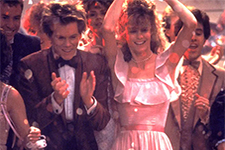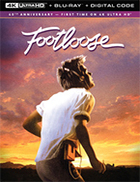Footloose (4K UHD)
|  Footloose is a decent movie that arrived at the perfect time. It was released in the early winter of 1984, the same year that MTV fully hit its stride as a cultural institution (by then it reached more than 20 million households), Sony was selling millions of Walkman portable cassette players, and the home video market, which at the time tended to favor more televisual films that could be watched in fragmented form over and over, was on the rise. Previous films like Saturday Night Fever (1977), Fame (1980), and Flashdance (1983) had already paved the way for the modern movie musical, as well as created an appetite for tie-in soundtracks. In other words, the culture and the market were in perfect alignment for a film like Footloose, which reignited the youth genre with the dynamics of music video aesthetics and has remained a cultural touchstone ever since. Set in the fictional Colorado town of Bomont, Footloose tells a familiar fish-out-water story about a rebel with a cause. The rebel-out-of-water, in this case, is Ren McCormack (Kevin Bacon in his first leading role), a high school senior who is having a hard time transitioning from the urban excitement of Chicago to Bomont’s restrictive, small-town environs. Having just moved there with his newly divorced mother (Frances Lee McCain), Ren, with his shaggy-chic haircut and New Wave wardrobe, finds it tough to fit in, especially when he discovers that Bomont has a city ordinance against public dancing, which for Ren is the ultimate expression of his individuality. The town looks to Reverend Shaw Moore (John Lithgow), the local pastor, for guidance in all moral matters even though his teenage daughter, Ariel (Lori Singer), is the local bad girl who listens to confiscated rock tapes, sleeps with her trashy boyfriend, Chuck (Jim Youngs), and has the audacity to wear red boots (“My daddy hates these boots,” she tells Chuck, thus underlining their appeal). Ren finds an unlikely friend in Willard Hewitt (Chris Penn), a decent good ol’ boy who appreciates Ren’s urban experiences without being able to participate in them (that is, he can’t dance). This essentially sets up a moral showdown between Reverend Moore, who sees dancing and rock music as gateways to sinful behavior, and Ren, who wants to be freed of adult shackles and finds in Bomont’s ban against dancing an issue with which he can define himself and save the town’s teenage population from cultural obscurity. Not surprisingly he becomes romantically involved with Ariel, who can’t resist the allure of the new boy from out of town, which only cements his reputation as a “trouble maker.” Written by Dean Pitchford, who until that point was a successful pop lyricist who had won an Oscar for Fame’s title track, Footloose is a high-concept musical perfectly formulated for the MTV Generation. As a songwriter, Pitchford obviously had a feel for how music could be integrated into the story without the traditional diegetic numbers in which actors break out into song and dance. Rather, as in Flashdance, the music in Footloose (all of which was original to the film and most of which was co-written by Pitchford) emerges naturally from the world of the story—boom boxes, car tape decks, and so forth—and the dancing we see feels naturalistic even as it expresses the characters’ emotions (the only time a musical number nudges into pure fantasy terrain is Ren’s angry one-man dance against the system in a deserted warehouse). Thus, a chicken race with tractors (a rural riff on the pivotal scene in Rebel Without a Cause) is given an additional emotional and narrative dynamic via Bonnie Tyler’s pulsating “Holding Out for a Hero” and a scene in which a drive-in hamburger joint turns into an impromptu dance scene reflects both the local teens’ desire to cut loose and the strong moral imperative that drives Reverend Shaw to keep it clamped down. Not surprisingly, Footloose is fairly one-dimensional in its treatment of religion, small town values, and personal freedom. The people of Bomont are so rigid that they actually hold a book burning in the town square (when they refer to Kurt Vonnegut’s Slaughterhouse Five, I swear they’re saying Slaughterhouse Vile), something that even Reverend Moore can’t abide. Pitchford’s script runs into trouble when it has to actually deal with the collision of different value systems, which is why a crucial conversation between Ren and Reverend Moore at the end of the film is left entirely off-screen in favor of the good pastor having a sudden and inexplicable change of heart in deciding that Ariel is grown up enough to make her own decisions about whether or not to attend a prom. That said, Footloose is frequently more interesting than many people give it credit for, and the very fact that you can talk about it and moral/ethical issues in the same sentence suggests that it runs deeper than the typical Hollywood teen genre fare. It helps that veteran director Herbert Ross was behind the camera. Having recently helmed an honest-to-goodness musical with Pennies From Heaven (1981) and directed Richard Dreyfuss to an Oscar in The Goodbye Girl (1977), he was well-suited to the material, drawing out its kinetic qualities without losing all sense of genuine drama (his casting of then-unknowns like Bacon, Penn, and Sarah Jessica Parker is also spot-on). Of course, one could certainly see Footloose as an example of crass ’80s commercialism in which story and substance come a distance second to soundtrack sales, but the fact that the film has persisted as long as it has (spawning both a 1998 Broadway musical and a 2011 remake) suggests that its tale of youthful rebellion and the desire for individuality speaks across generations.
Copyright © 2024 James Kendrick Thoughts? E-mail James Kendrick All images copyright © Paramount Home Entertainment | |||||||||||||||||||||||||||||
Overall Rating: 

 (3)
(3)


